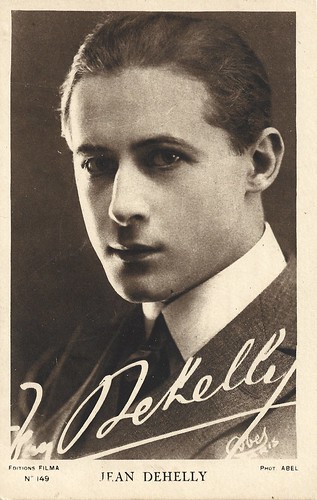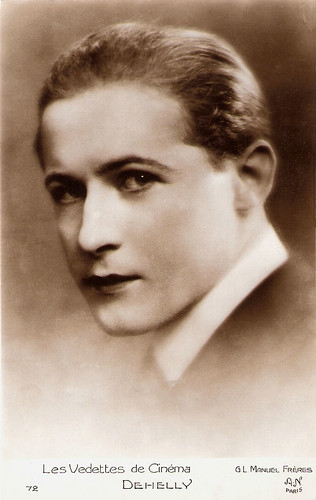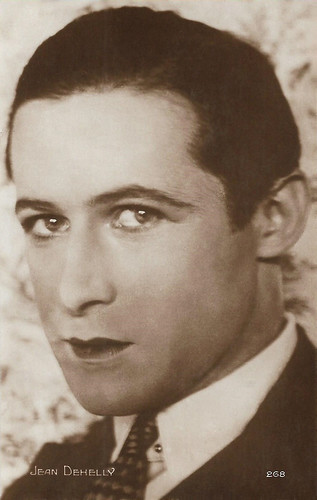
French postcard by Editions Filma, no. 149. Photo: Abel, Paris.
The prodigal son
Jean Louis Léon Dehelly was born in 1896 in Paris, France. He was the son of actor Émile Dehelly and his wife Valentine (née Stratsaert). Émile was a member of the Comédie-Française and also acted in silent films.
Jean started his film career at a young age in the short drama L'enfant prodigue (Georges Berr, 1909). He played the prodigal son from the Bible story and his father by Henry Sylvain and his older brother by René Alexandre. The Moving Picture World (20 November 1909) loved the film: "A beautifully coloured production illustrating the scriptural story which is familiar to all students and readers of the Bible. Mr. Lavedan, who prepared the drama of the "Duke of Guise," which was called by many competent critics one of the best motion picture dramas ever offered to the public, prepared this one also. And he has done his work well."
After studying in England, he felt that he had a real aptitude for painting and went on to attend a graphic arts school in France. The First World War put an end to his training. Enlisted at the front, he was discharged following an illness at the end of 1918. Jean continued his film career with leading roles in such films as Les trois gants de la dame en noir/The Three Gloves of the Woman in Black (Pierre Marodon, 1920), Fils du vent/Son of the Wind (Louis de Carbonnat, 1920) and Jettatura (Pierre-Gilles Veber, 1921).
Jean Dehelly appeared with Louis Leubas and Pierre Fresnay in a 7-part serial for Pathé La bâillonnée/The gagged woman (Charles Burguet, 1922) and with Edith Jéhanne in the 10-part serial Rouletabille chez les bohémiens (Henri Fescourt, 1922) where he played the elegant Jean de Santierne, a friend of Gabriel de Gravone alias Rouletabille, the famous journalist imagined by Gaston Leroux. Dehelly also worked in the theatre. He played in a musical composition by Jean Nougès 'Le messager de la victoire' (1921) at the Gaumont-Palace where he played almost naked. Then he was cast in 'L'ombre rouge' (1922) in Liège, and in the pantomime 'Chand d'habits' (1922) at the Gaieté-Lyrique.
In René Hervil's comedy Le secret de Polichinelle/Polichinelle's secret (1923), adapted from Pierre Wolf's play, he is the son of Maurice de Féraudy and Jeanne Cheirel. Other films of that period include Prix de beauté/The price of beauty (René Carrère, 1922), Par-dessus le mur/Over the wall (Pierre Colombier, 1923) with Saint-Granier and Dolly Davis, and Le chemin de l'abîme/The path to the abyss (Adrien Caillard, 1923) starring Edmond van Daele.

French postcard in the Les vedettes de cinéma series by A.N., Paris, no. 72. Photo: G.L. Manuel Frères.

French postcard by Editions Cinémagazine, no. 268.
His best performance
Jean Dehelly reunited with Dolly Davis in the film Il ne faut pas jouer avec le feu/Don't play with fire (Mario Nalpas, 1924) and co-starred with Joysanne in Le mariage de Rosine/The Marriage of Rosine (Pierre Colombier, 1925). He was the lead in Les élus de la mer/Lure of the Sea (Marcel Dumont, Gaston Roudès, 1925), also with Gaston Modot and Simone Vaudry.
During the second half of the 1920s, Dehelly appeared in international silent films such as the British Sheik drama Sahara Love (Sinclair Hill, 1926), credited as John Dehelly, and the German film Die Frau die nicht nein sagen kann/The woman who can't say no (Fred Sauer, 1927) starring Lee Parry and Gustav Fröhlich.
Back in France, he played in La terre qui meurt/The Land That Dies (Jean Choux, 1927) with Gilbert Dalleu and Madeleine Renaud, the interesting comedy Le mariage de Mademoiselle Beulemans/The Marriage of Mademoiselle Beulemans (Julie Duvivier, 1928) with Andrée Brabant, and the docu-drama Verdun, visions d'histoire/Verdun: Visions of History (Léon Poirier, 1928), a dramatic re-enactment of the battle of Verdun during World War I, as seen by both French and German sides. At CinéArtistes, Pascal Donald writes: "he plays a young soldier in love who, in the hell of the battlefield, keeps hope and faith in the future, certainly his best performance.
His career suffered from the introduction of sound film. His sound films include Virages/Turns (André Jaeger-Schmidt, 1930), La voie du bonheur/The way to happiness (Léo Joannon, 1931) and L'amour en vitesse/Love in a hurry (Johannes Guter, Claude Heymann, 1932), again with Dolly Davis. Pascal Donald: "Although he is still as attractive as ever, he, unfortunately, does not have the voice to match his looks." His final film was Votre sourire/Your smile (Monty Banks, Pierre Caron, 1934) starring Victor Boucher and Marie Glory. He also produced the film, but it was not a success.
He returned to the stage at the Théâtre Antoine with the role of Count Almaviva in Beaumarchais' 'The Barber of Seville' (1934), and of Léandre in Racine's verse comedy 'Les plaideurs' (1933). He then gave up acting for good to devote himself fully to his painting. He was already known as a painter and he exhibited at the Salon des indépendants in 1927. With his partner Olga Mischkine (1910-1995), known as an actress and painter under the name of Olga Lord, Jean Dehelly lived for a long time in a barge on the Seine. He was a well-known painter and lived the last years of his life in Gambais, in the Yvelines. Jean Dehelly died in 1964 in Paris, France. He was 68.

French postcard by Editions Cinémagazine, no. 552. Photo: Jean Dehelly as the symbolic figure of the young man and an anonymous local woman as the symbolic figure of the young woman in Léon Poirier's silent film Verdun, visions d'histoire/Verdun, historical visions (Léon Poirier, 1928).

French postcard for the two-part film Les Trois mousquetaires (Le Film d'Art, 1913, directed by Henry Pouctal) and based on Alexandre Dumas père's famous novel. The film starred Jean's father, Emile Dehelly as D'Artagnan.
Sources: Pascal Donald (Cinéartistes - French), Wikipedia (French) and IMDb.
This post was last updated on 11 December 2023.
No comments:
Post a Comment